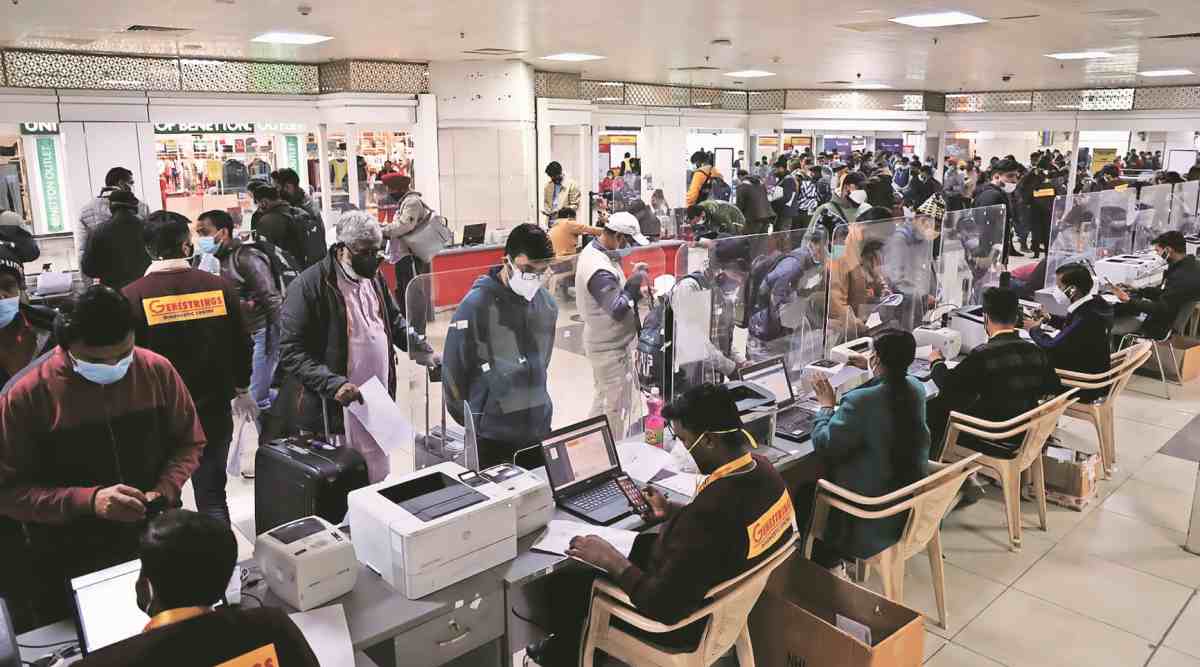 Passengers line up to register for a Covid test at IGI airport, Thursday. Tashi Tobgyal
Passengers line up to register for a Covid test at IGI airport, Thursday. Tashi Tobgyal An increase in the number of private sector labs since the second wave last year has helped Delhi push up the number of daily Covid tests. On a day when the capital reported over 15,000 new Covid cases, 98,434 tests were conducted, as per Thursday’s health bulletin.
While this is less than the 1 lakh tests conducted on five instances in early-April 2021, the number of the more accurate molecular tests was the highest ever. As per Thursday’s bulletin, 80,051 tests were conducted using the gold standard RT-PCR, CB-NAAT, or TrueNat methods — constituting 81.3% of total tests conducted in Delhi in the last 24 hours.
On the five days when the total tests crossed the 1 lakh-mark previously, just over 71,000 of the tests were conducted using RT-PCR and other molecular methods — constituting 66% of the total tests on an average — Delhi government data shows.
Keeping in mind the fast-spreading omicron variant, Chief Minister Arvind Kejriwal had announced two weeks ago that Delhi was ready to conduct 3 lakh tests a day if needed.
Increased capacity in labs
There has been a massive increase in the number of private sector labs and their capacity since April-May last year, with the government sending over half the samples it collects to them for processing.
At the time of the delta wave in the city, even with fewer than 1 lakh tests being conducted on most days, the system was choked. Several labs had reported pendency of samples and reports were delayed by at least 5-8 days. People had also reported that no testing slots were available at private labs, and home-collection had virtually stopped.
During the second wave, the Delhi government had claimed its testing capacity was 1 lakh. To achieve the current target of 3 lakh tests a day, infrastructure would have to be scaled up by three times. A senior official from the state health department said, “We already have the 3-lakh capacity, it is largely thanks to the private sector labs that have come up. The government sends nearly 50,000 samples a day to these labs.”
Some government labs have also increased their capacity since. Take for instance, Institute of Liver and Biliary Sciences that used to process about 500 samples a day from other government hospitals in addition to the 100-150 samples from its own patients.
“We now have three automated extractors (to extract viral RNA from the sample, which technicians used to do manually for each sample in 2020). During the second wave, we got a backup for the machine and got another extractor from ICMR. We also got a back-up RT-PCR machine during the wave. Our hospital is now equipped to process 1,000-1,500 samples a day in addition to our own in-hospital samples given enough reagents,” said Dr Ekta Gupta, professor of virology at the hospital. The hospital’s capacity has been enhanced three-fold.
As per another official, capacity was also increased in large medical colleges like Lady Hardinge Medical College and Maulana Azad Medical College.
When cases started rising, government collected data from all government and private labs across the city on their maximum testing capacity and allocated a quota to each district.
A district official, on condition of anonymity, said, “The target for my district was to conduct 3,000 tests daily; the numbers have now gone up to about 4,500 as people are scared and getting tested more often. I have been allocated a capacity of 9,000 tests by the government.”
The official added, “My quota includes at least six-seven labs that are new and have been set up since the second wave.”
Another official from the Delhi government said, “Even though cases have gone up sharply, there is no delay in getting reports. All reports are processed within 24 hours.”
However, the low-price capping by the Delhi government has discouraged existing private players from expanding capacity. Last August, the government had capped the price for samples collected by the government at Rs 300 (paid by the government), samples given at a hospital or lab at Rs 500, and samples collected from home at Rs 700.
A private lab owner of the city said, “To scale up capacity, we need new machines, more space, and, more importantly, more trained manpower that is not available. Add to that the reduced costs of the test, and nobody can afford to do it.”
An expert in the know of the matter said, “There hasn’t been even a 50% increase in existing labs in Delhi since the previous wave. The capacity is more or less similar to what was there during the peak delta wave. This is because the cost has been capped by the government. Other than in such surge situations, you hardly do such bulk testing.”
The expert added that the 3-lakh capacity will likely be realised using rapid antigen tests. The proportion of rapid antigen tests has already increased from 10% to 20% in Delhi; the Centre, however, has called for increase in testing even using rapid kits where RT-PCR is not possible.
Incidentally, a yet-to-be peer reviewed study from the US shows that for the first two days, 28 of 30 people found RT-PCR positive in a workplace tested falsely negative on a rapid antigen test even though their viral load was within the infectious range for omicron transmission. The median time from first positive PCR to first detectable antigen positive was 3 days, as per the study.
“A false negative does more harm as people go about their daily lives and spread the infection,” the expert said.
- The Indian Express website has been rated GREEN for its credibility and trustworthiness by Newsguard, a global service that rates news sources for their journalistic standards.

